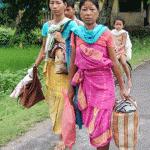The girls of the villages get married early due to the threat of Bangladeshi ‘Mullah culture’.
The most awful situation is that in some Bangladeshi village areas, there is one or two small health centres but these do not have basic facilities. There, doctors are quite helpless and as such instead of giving medicines, they offer only prescriptions. Want of ambulance many times forces the patients to face many troubles,” admitted a physician of a sanatorium at Tamabil, an International Border Town (IBT) under Sylhet Division of Sylhet district of Bangladesh, who doesn’t want to disclose his name.
“Moreover, even the Bangladeshi children do not have any good opportunity of vaccination or anti-disease injections for want of facilities or medical helps of any sort and so the death rate of the children is very high. As a result, sometimes these children fall victims of ‘polio’ and such other diseases,” rued a Bangladeshi doctor of a Public Health Centre (PHC), who came to India for better treatment for his children and doesn’t want to disclose his name.
He added, “Sometimes, most of the ailing patients die of diseases such as diphtheria, typhoid, measles, tetanus, cholera, pneumonia, black fever, diarrhea, dengue, chronic dysentery, jaundice, etc”.
Saahid Mamun, an eminent social observer, who lives in Bangladesh’s district headquarters Naogaon’s Pouro Bazar area acknowledged, “Treatment in India is easier and cheaper than other cities in the World”. While the officials of the BSFI stated: “It is a fact that through the International Border Immigration Check-Post (IBICP) at Hili in South Dinajpur district of West Bengal, most of the Bangladeshis visit India for ‘medical treatment’. Because, the healthcare facilities in their nation are of substandard quality and costly.”
During rainy season or any other critical conditions, the patients, who live on the India-Bangladesh International Border areas, are bound to go to the international borders…
Supporting the fact, the local journalist-cum-observer, Majidur Sardar, who lives at Bolla village under South Dianjpur district of West Bengal, maintained, “If you come to Balurghat, Raiganj and its adjoining areas, which are situated under South Dinajpur District (administration), ), you will find many Bangladeshis, who have every-now-and-then are caught red-handed or sometimes have escaped from the clutch of the BSF. They come to our areas for better medical treatment purposes. In a word,I can say, around 20 per-cent to 25 per cent Bangladeshis enter India, especially through this district for medical reasons, apart from others’ intentions, per year.” Apart from this, “some places of Bangladesh have no opportunity of maternity homes or such other institutions like that and so pregnant women often die a premature death. Specially, the inhabitants of the said country have no other alternative but to take help of either medical compounder or untrained country physician known as kabiraj or also the quacks, who treat these unfortunate women and their children with country-made medicines,” affirmed Sabana Khatun, Muhammad Shaukat Mondol, and Muhammad Anisur Rahaman, who’re living in the villages like Chenchra, Hili (presently known as Bagiar) and Haripukur (presently known as Daudpur) of Dianjpur district of Bangladesh, (which lie on the zero-line) and come to India for their better treatment or medical purposes.
“Indeed, in Bangladesh, people are witnessing a high rate of immortality. The reason is: the Government of Bangladesh has no concrete family planning scheme and the iron grip of the Mullahs (that is, Muslim priests) over the poor people, who preach that family planning is against the dictates of the Muslim religious scriptures.
“Specially, the inhabitants of the village areas have no idea about ‘family planning’. The girls of the villages get married early due to the threat of Bangladeshi ‘Mullah culture’. It happens, when they are 12 years old or 13 years old, which also compel them to attain early motherhood and premature death both,” stated Muhammad Fazlul Rahman Sarkar, a resident of Dhaka, and the member of the Bangladesh Astronomical Society (BAS).
This leads to superstition, which has grown everywhere in the country in the name of the control of diseases. During rainy season or any other critical conditions, the patients, who live on the India-Bangladesh International Border areas, are bound to go to the international borders and request the soldiers of the BSF to help them.
…the Government of India should not only look into the matter sincerely but also take tough action before the situation goes out of hand in the name of ‘medical tourism’!
“There are not too many chemist shops, dispensaries and pharmacies, which compel the Bangladeshis to believe in quacks. Even, the absence of doctors, compounders, hospitals, pharmacies, or any type of treatment in the village areas that are situated in the riverine Char areas cause untold miseries and as a result of these, the patients have to suffer a lot and die premature death, when any epidemic breaks out there, whether during flood or typhoon or other natural disasters and natural calamities,” revealed 20-year old Apel Mollah of International Riverine Border Village (IRBV) Khewarchar of Kurigram District of Bangladesh as well as the Muhammad Mahidul Islam (19) and Muhammad Jainal Abedin (18), both of IRBV Daikhowarchar in the same district of Bangladesh.
Against this backdrop, the decision of the Indian Central Government to set up an All India Institute of Medical Sciences (AIIMS-like hospital at Raiganj, under North Dinajpur District, earlier known as East Dinajpur district) of West Bengal has not only made poor International Border Village People (IBVP) and International Border Town (IBT) proud but also the neighbouring country Bangladesh very delightful.
Though, this news has come as a relief to many Bangladeshi nationals, who often cross the international border for specialised treatment in India, the Government of India should not only look into the matter sincerely but also take tough action before the situation goes out of hand in the name of ‘medical tourism’!




